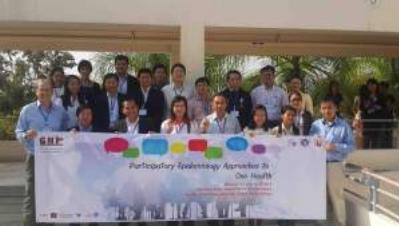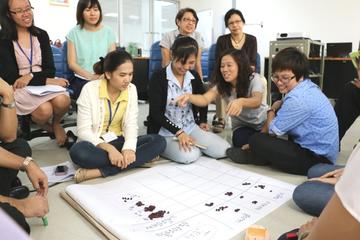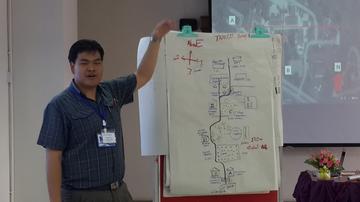ComAcross Participatory Epidemiology Training: Infectious Fun
The Com-Across Project and CIRAD are supporting a training initiative in Participatory Epidemiology (PE) in South East Asia to contribute to skills development useful in for the implementation of One Health approaches in the region. PE takes a trans-disciplinary approach that compliments One Health and EcoHealth approaches. IT utilizes the methods of participatory rural appraisal and participatory learning and action to find solutions to epidemiological challenges.
ComAcross and CIRAD have asked Participatory Epidemiology Network for Animal and Public Health (PENAPH) and two regional sub-networks for Asia and the Pacific (APPEN) and South East Asia (SEA-PREID) to provide the technical training expertise on PE. In 2014, CIRAD supported a Training of Trainers Workshop that accredited PE practitioners from three universities to conduct practitioner training workshops on PE. The training team comes from Kasetsart, Khon Kaen and Chiang Mai Universities and is supported by on-site backstopping from PENAPH.
Figure 1: PE Practitioner Trainees from Cambodia and Laos
Currently, ComAcross is supporting the regional training team to lead a series of Practitioner Training Workshops for ComAcross participants form Thailand, Laos and Cambodia. The training courses are divided into one 5-day session of classroom learning and practice followed by 5 days on field practice in the participants home country. Participants come from medical, veterinary, social and environmental and animal science backgrounds.
The classroom components of PE training have been completed for all participants. The session for participants from Laos and Cambodia (Figure 1) was held in conjunction with Global Health Institute meeting at Chiang Mai University. Background and concepts are covered in the first day in the classroom. Participants discuss the meaning of participation and gain an overview of participatory rural appraisal techniques. Days 2 to 4 focus on in-class role-playing where participants practice semi-structured interview skills, ranking, scoring (photo below), mapping and diagraming (Figure 3) techniques. On the last day of classroom work, the participants prepare their checklist and study plan for the fieldwork assignment.
Figure 2: Role Playing Matrix Scoring at the Thai PE Training Workshop
During the field practice, participants will be asked to unravel a real field situation in a series of interviews over 5 days. This allows them to put in practice both the interview and analytical or learning skills used in PE. Analysis in PE is a process of weighing of evidence where the information resulting from different informants and different activities is compared and contrasted to construct a best-bet scenario. The results of each days activities are reviewed and the study plan is adjusted based on the days learning in a process called iterative analysis.
Figure 3: Participant Presents a Diagram of a Transect Walk
The fieldwork for the Thai course will take place in the first week of March in Ayutthaya and will focus on health issues related to flooding. The field activities for the Laotian team will follow work on stakeholder prioritization of zoonotic parasitic disease and the Cambodia group will examine community knowledge of Japanese encephalitis. The practitioner trainees are enthusiastic and eager to apply their new skills in the field.
PE training workshops seek to create a relaxed, safe and fun environment for learning. The PENAPH and ComAcross representatives were overwhelmed by the friendly and fun atmosphere that the SEA training team and participants created. PE is off to a solid start in the region thanks to ComAcross, national stakeholders and very creative participants.
Published: 27/05/2015



